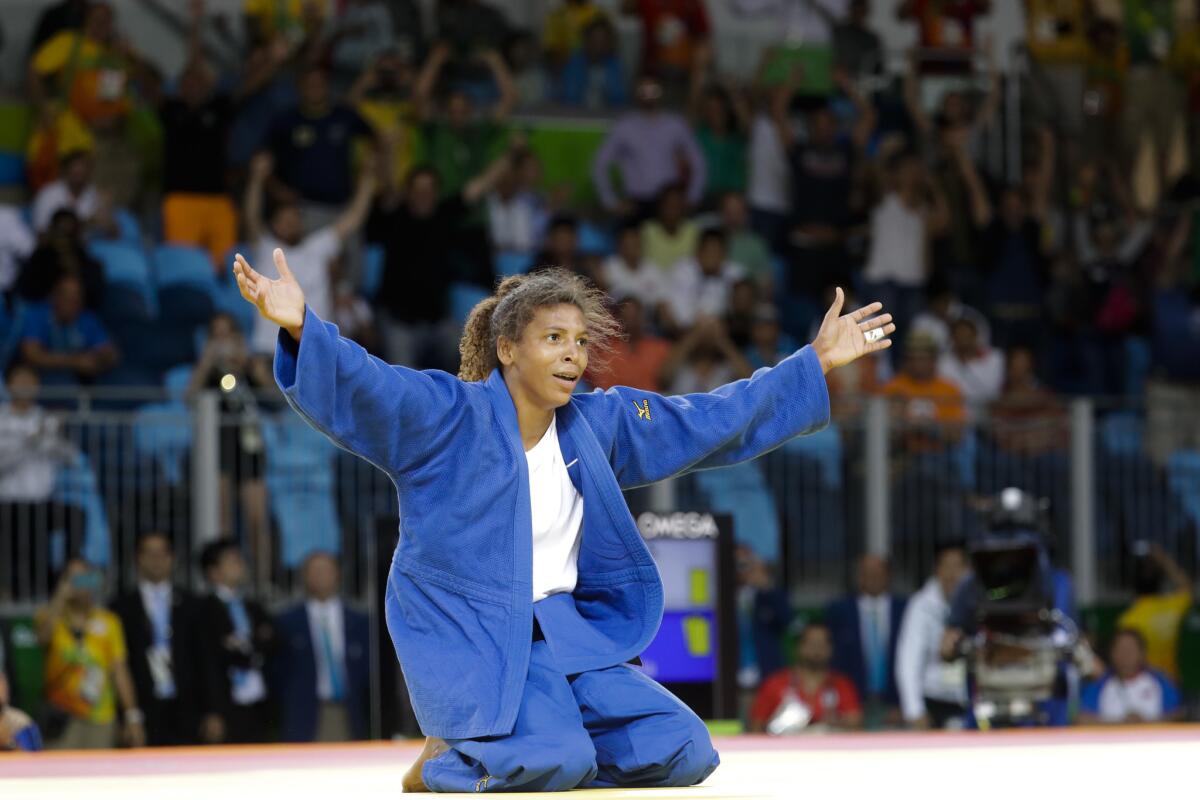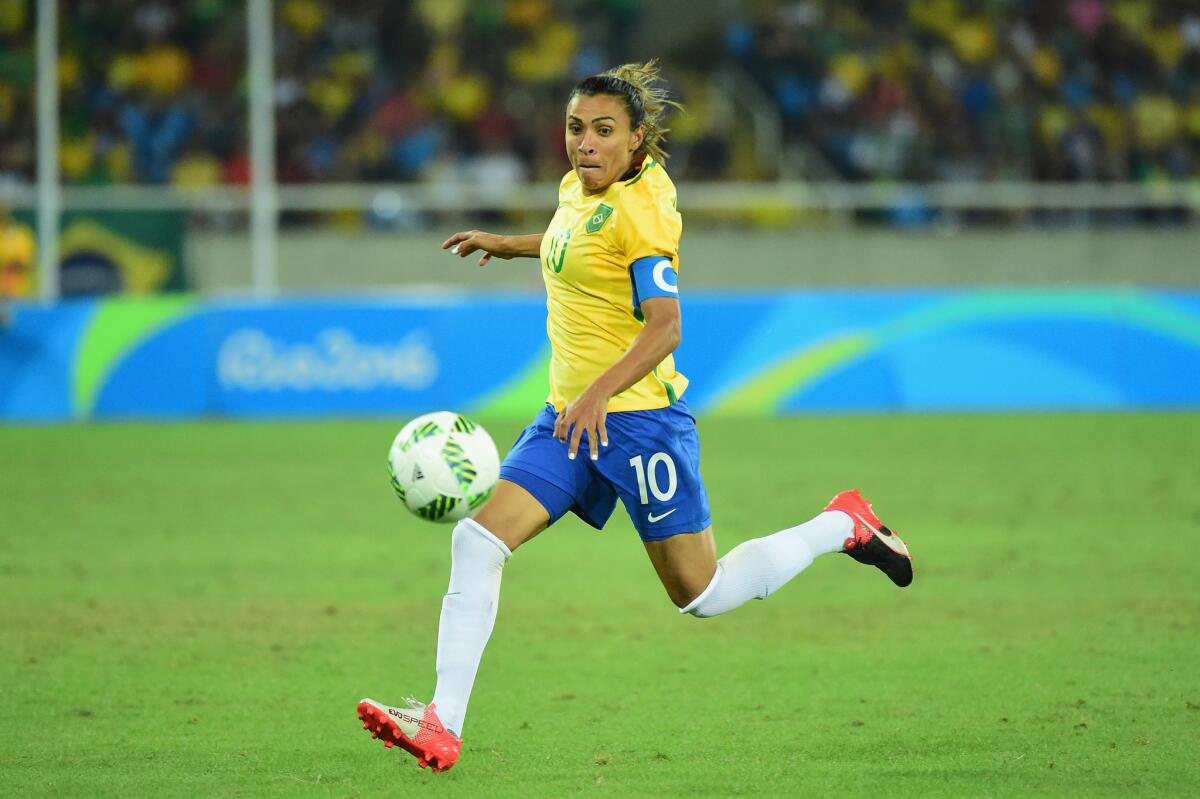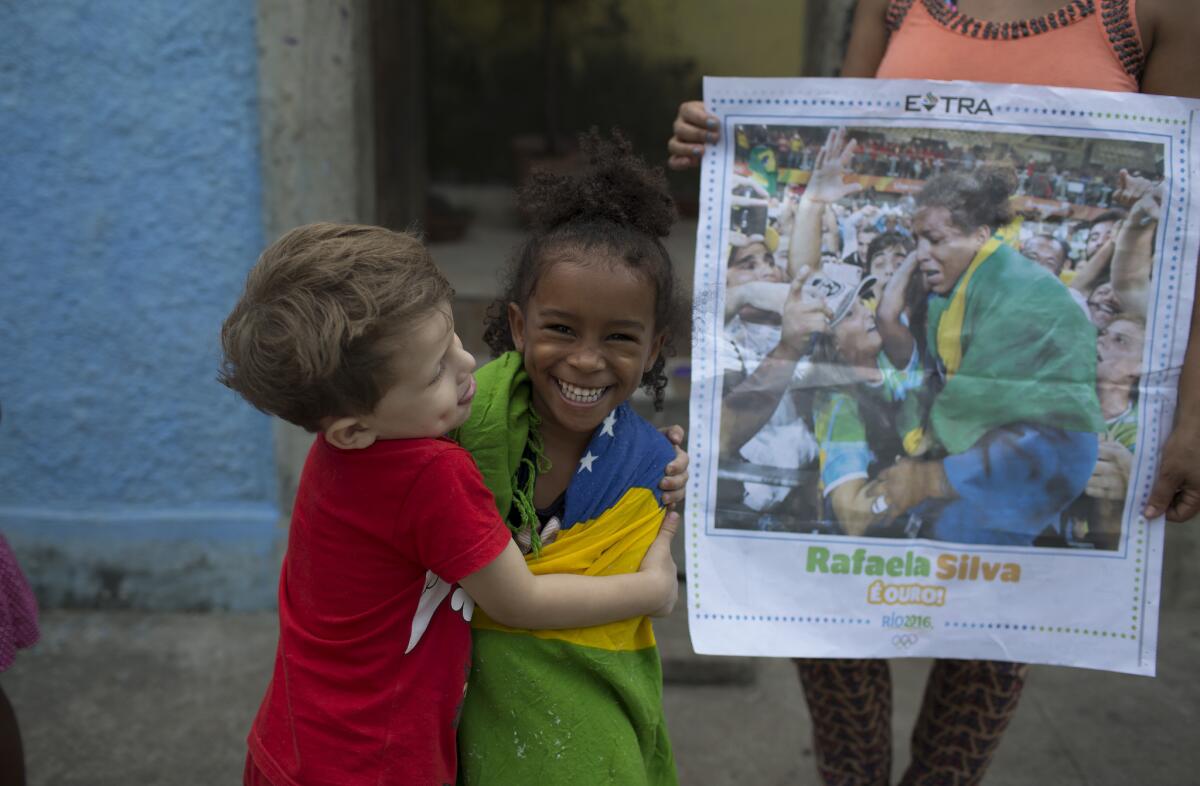Marta and Rafaela: Brazil’s Olympic heroes may be a sign of the nation’s shifting attitudes

- Share via
Reporting from rio de janeiro — Just after Rafaela Silva won the first Brazilian gold medal at the Rio Olympics, she broke down and wept in front of a camera, just managing to deliver a few words to her country.
“Everyone criticized me. They said judo wasn’t for me,” said Silva, 24, who grew up in a troubled favela just miles from the Olympic village and almost quit her sport when she received racist abuse after failing at the London Olympics.
“They said I was an embarrassment to my family,” she said, sobbing. “And now I’m an Olympic champion in my own home.”
They said I was an embarrassment to my family. And now I’m an Olympic champion in my own home.
— Rafaela Silva
For Brazilians, the video clip is hard to watch without crying themselves. It raced around Brazil’s social networks.
The same day, Monday, Brazil’s men soccer team, by far the most popular group of athletes in the country, took on Iraq. As the players flailed against their low-ranked opponents — the game ended in a scoreless tie — the crowd taunted them by shouting “Marta!” — a reference to Marta Vieira da Silva, the soccer phenomenon who led the women’s squad to a resounding victory, 5-1, over Sweden.
Pictures were posted of Brazilians crossing the name of male soccer star Neymar, who is playing on the national team, off their jerseys and writing “Marta” with markers.
Now the names Rafaela and Marta seem to be everywhere. In the tradition of soccer greats Pelé and Ronaldo, Brazil’s sports heroes almost always are referred to by one name. That these two stars are women, black and from humble backgrounds is seen as deeply significant in a country that has grappled with racism, brutal inequality and machismo in sports.
“I have to say I have gotten very emotional,” said Larissa Cayala, a 20-year-old student in Rio de Janeiro. “Consider the context. Brazil is a country which can be extremely racist and misogynistic. The elevation of these strong women in traditionally male sports is proving it’s possible for us to overcome these difficulties. They’re proof we’re no longer in the times of our grandparents, and we own our dreams and our futures.”

In the days since Rafaela and Marta took center stage in Rio, they’ve moved to the center of a national conversation that has taken place largely online. Brazil’s tech-savvy population has flooded social networks with messages affirming women in sports, distributing memes that read “fight like a woman,” with pictures of Rafaela, or “Marta is better than Neymar!”
Questions of gender, race and representation have resonated in Brazilian politics in recent months. In May, Dilma Rousseff, Brazil’s first woman president, was removed from office. She now faces an impeachment trial over allegations of budget irregularities. Michel Temer, her much more conservative vice president and interim successor, immediately replaced her entire cabinet with a new group entirely composed of white men. Less than half of Brazilians identify as white.
Rafaela and Marta grew up far from the elite circles that still mostly dominate Latin America’s largest country. Marta, now widely considered the world’s best player, was born in a tiny town in the backlands of Brazil’s poor northeastern region. Rafaela grew up in a violent slum known as the “City of God” favela. It was famously shown to the world in a film of the same name directed by Fernando Meirelles, who also put on the Rio 2016 opening ceremony.
When she was disqualified for an illegal move in London in 2012, Rafaela showed news cameras racist insults being hurled at her on Twitter. The move, Twitter users said, was tricky, thuggish behavior, and others called her a monkey and said she needed to be in a cage.
She took on that abusive treatment after winning this week, saying “the monkey that needed to be in her cage is now an Olympic champion.” All week she has been a darling of Brazilian media, which usually puts white faces front and center, and has been accused of treating female athletes more as models than competitors.

Over the last 100 years, Brazil has often elevated poor or black athletes, but they have rarely been women. Soccer, or futebol, and judo have both often been seen as a sports best left to men.
“I don’t really like watching women in sports,” said one older man in a working-class Rio bar watching Marta’s squad demolish Sweden. He seemed to be the only one in the room holding that opinion. The crowd of about 20 women and men looked at him in shock. “But this is different, they are great,” he quickly corrected himself. The crowd ignored him after that.
Didi Lima, a 29-year-old producer from Sao Paulo who often watched women’s soccer with her girlfriend, later spoke about the significance of the two Brazilian heroines.
“Brazil has never had feminine idols. It was always Pelé, or [Formula One driver] Ayrton Senna,” she said. “What’s happening is really important. Kids around the country are seeing women be elevated as heroes during the Olympics in their own country.”
It’s also seen as significant that the media and fans have spent little time discussing that Rafaela has a girlfriend. Those who have long followed her career already knew her sexual orientation, but Rafaela came out to the media after her win.
But that’s not to say that homophobia, sexism or racism have disappeared from Brazilian sports. Some fans reportedly jeered the players in the Canada-Australia women’s soccer match with a gay slur.
And some conservative commentators have used the cases of Rafaela and Marta to try to prove that women or blacks aren’t actually oppressed here and don’t need help, says Lola Aronovich, a university professor in the state of Ceará and one of Brazil’s best-known feminist writers.
See more of our top stories on Facebook »
“Some people want to take the shine off of victories achieved by poor, black women,” said Aronovich, who added that she often receives threats of death or rape for speaking out online. “This is a really amazing moment for women and very important, but there’s still a very long way to go. Our memory can be short here, and while they have so much attention I hope other poor young women are inspired to compete and that they find the infrastructure to do so.”
As of Thursday afternoon, Brazil had won only three medals. Along with Rafaela’s gold, Felipe Wu took the silver in the 10-meter air pistol competition and another woman, Mayra Aguiar, won bronze, also in judo. Marta’s team has been so dominant that she rested her third game, and her squad marches on with high Olympic hopes.
The men’s team found its groove Wednesday night, earning its first win and moving back to its traditional place in the spotlight. When Folha de S.Paulo, Brazil’s prominent national newspaper, announced the team’s 4-0 trouncing of Denmark, it blared the news in all caps:
“THEY PLAYED LIKE MARTA.”
Bevins is a special correspondent.
ALSO
Can you take an unplayable lie if your ball is next to a furry rodent the size of a pig?
She’s ‘old for a woman’: Media around the world condemned for sexist Olympic coverage
Spirits are low at Russia’s Olympics party house, with fans grumbling that doping bans are unfair
More to Read
Sign up for Essential California
The most important California stories and recommendations in your inbox every morning.
You may occasionally receive promotional content from the Los Angeles Times.









